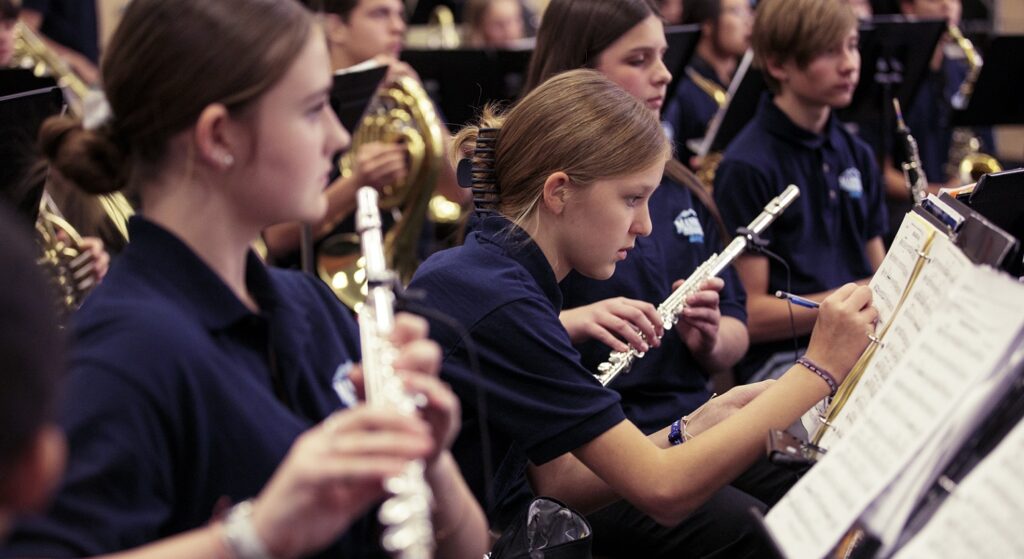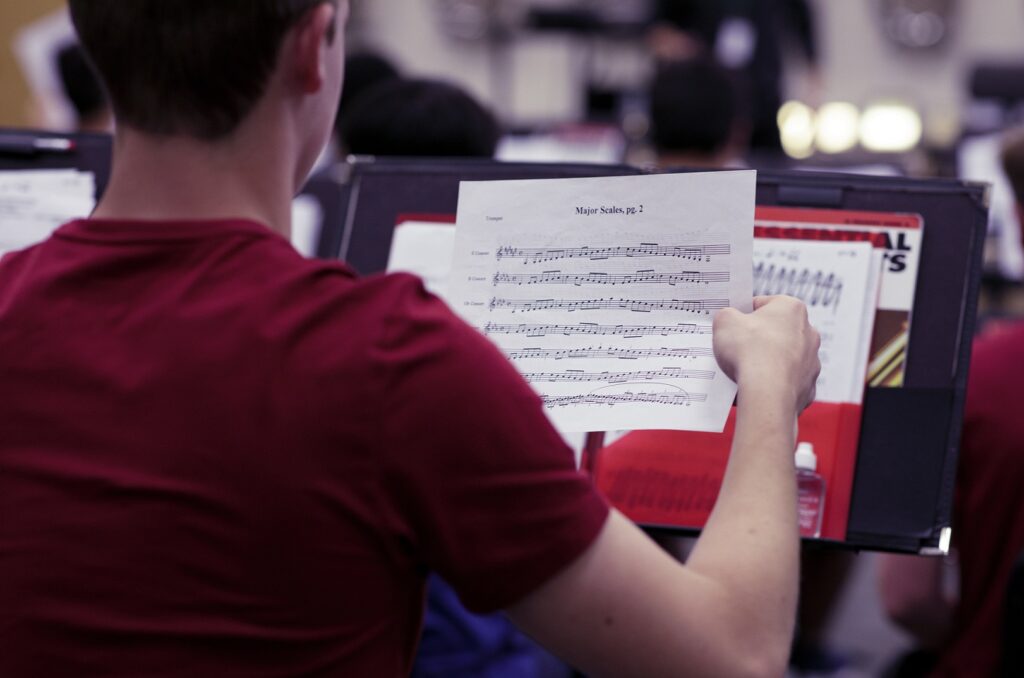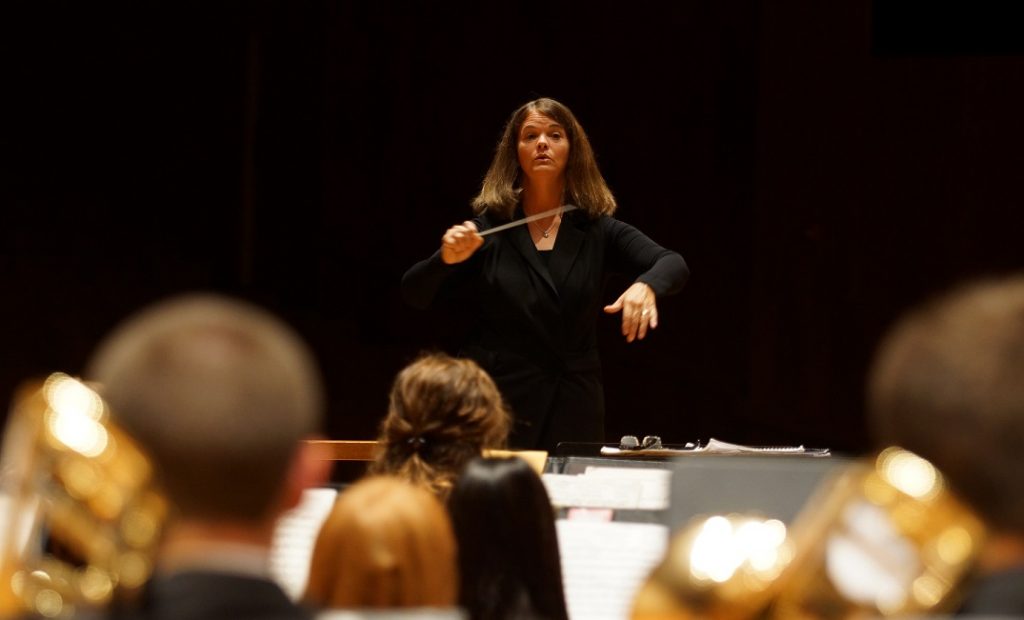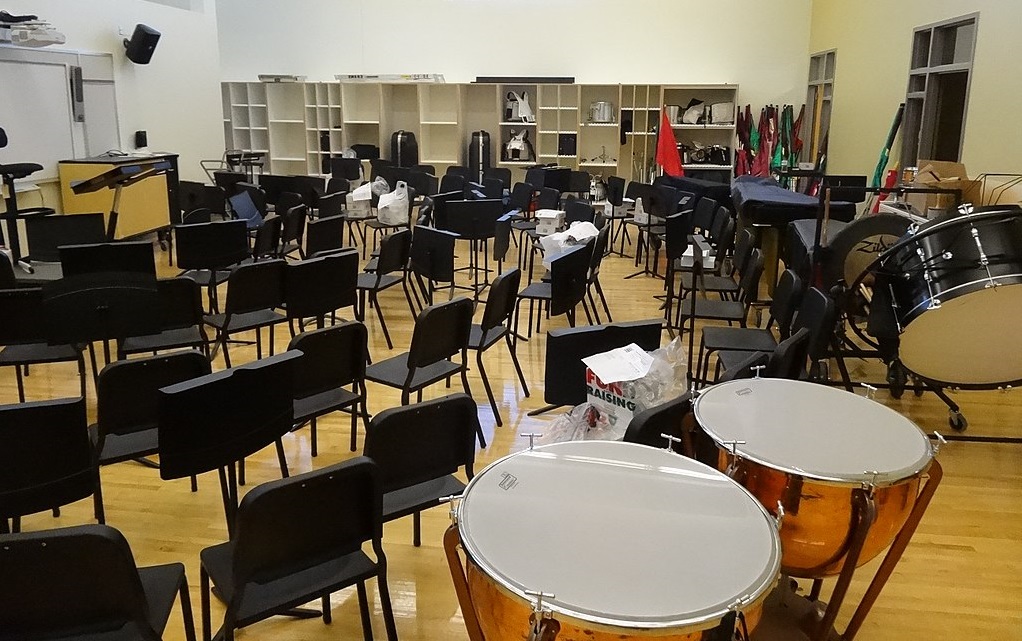Tagged Under:
Rehearsal Shouldn’t Be a Punishment
You don’t have to run your classroom like a drill sergeant to get positive results.
He was two minutes late. Again. I saw him slide into his seat without a care in the world. No apology. No rush. Just chatting as he opened his case like it was any other day.
I lost it.
Not a full-volume, throw-your-stand meltdown. But the sharp, sarcastic kind of snapping. The “Wow, must be nice to show up whenever you feel like it” that gets a laugh from the room and a flinch from the kid.
He got quiet. I felt like a jerk. And rehearsal hadn’t even started yet.
I don’t even remember how the rest of the rehearsal went that day. Probably fine. What stuck with me was the feeling afterward — that slow, sinking sense that I’d just become the teacher I promised I wouldn’t be.

You’re Not Crazy — This Part Is Hard
When I was in college, we spent a lot of time talking about score study and rehearsal pacing. No one warned me about the emotional whiplash of teaching music to 120 teenagers before lunch. Or that some days, it wouldn’t feel like “teaching music” at all — just behavior management with background percussion.
Like the day I spent 10 minutes trying to get a section to stop playing “Seven Nation Army” during transitions. Or when I realized that the kids were so used to me saying “Shhh” that they had turned it into a call-and-response bit:
- “Shhh.”
- “Sorry Mr. Stinson.”
- (Back to talking.)
They’re not bad kids. They’re just kids. And when you’re tired, behind on paperwork and worried about the spring concert, it’s easy to take that personally.
At one point during my second year of teaching, I had a legit crisis moment during my planning period. I pulled out my phone, looked at job listings and thought, I’m not cut out for this. Turns out I was just burned out, hungry and hadn’t gone to the bathroom since 6:45 a.m.
This job will test you in ways that have nothing to do with music. No one tells you how much of it is just managing moods — theirs and yours.
If you’re feeling overwhelmed or resentful, that doesn’t mean you’re doing it wrong. It means you’re human.

High Standards Don’t Require Hostility
Here’s where I got stuck early on: I thought the only way to get students to take me seriously was to sound serious. I used a firm voice, narrowed my eyes — it was a whole routine.
I had one trumpet player (let’s call him Derek) who never brought a pencil. I made it a whole thing. Called it out, pointed to the board, reminded him daily. He’d nod and still forget the next day. Eventually I gave him a pencil jar and told him I’d take five points off his playing test every time he didn’t use it. He rolled his eyes and said, “Cool, I’ll just take the B.”
Fantastic.
After that, I stopped trying to win the power struggle. I moved the pencils to the front, didn’t say anything, and just wrote “Pencil?” in tiny letters on his stand each time he forgot.
After three days, he brought his own.
That’s when it clicked for me: I was wasting energy trying to control him instead of making the right behavior the easiest choice.
Now I focus less on volume and more on clarity. I’ll say, “Let’s try that again with better posture,” instead of “You guys look like a bunch of slugs.” I’ll pause the room with a quiet, “Hold up — we can do that cleaner,” instead of raising my voice.
It feels less dramatic, which I used to think meant “less effective.” Weirdly, the quieter I got, the more the room tuned in. Maybe because it felt less like a fight and more like an invitation to get better.

Build Routines That Students Actually Want to Follow
No one explains this in methods class: Teenagers are chaos machines. If there’s no structure, they’ll invent one, and it probably involves noise, hallway wandering or a 10-minute debate about whether mayonnaise counts as an instrument (thanks so much to SpongeBob for this — and yes, that is sarcasm).
I used to try to fight it by micromanaging everything. Unpack faster! Sit down! Stop playing random notes! Every rehearsal started with me narrating basic procedures like a frazzled flight attendant. Eventually, I gave up — not on the kids, but on me being the center of everything.
I wrote a basic checklist on the board. Nothing cute or clever. Just:
- Get out instrument
- Sit in assigned seat
- Play [warmup line]
- Ready by [specific time]
I made it part of the culture — “this is how we start, every day.” If someone wasn’t ready, I didn’t stop the world. I just started without them. They figured it out. If it became a consistent problem, we handled it privately.
Some days the checklist feels unnecessary. Other days it’s the only thing standing between us and total anarchy. But the consistency means I don’t have to perform at the start of every rehearsal. It also helps the anxious kids know what’s coming — they don’t have to guess.
Side note: I also stopped playing music during setup time. I know some teachers love it. For me, it just created more talking and dancing and less “read the board.” I save the hype playlists for sectionals now.

You Can Hold Kids Accountable Without Hating the Sound of Your Own Voice
I used to think that if I wasn’t correcting something every two minutes, I wasn’t doing my job. So, I said everything out loud.
Every late entrance. Every missed accidental. Every kid who wasn’t sitting tall. It was like a running commentary, but somehow only I was annoyed by it.
Eventually, I realized: If you’re constantly narrating every flaw, no one can hear the music. Not them. Not you.
So, I tried something new. I kept a sticky note on my stand labeled “Follow-Up.” During rehearsal, if a student did something that needed attention but didn’t need a public scene, I’d jot it down. After rehearsal, I’d quietly check in. “Hey, I noticed a few things — want to talk?”
Sometimes they would admit that they were distracted. Sometimes they had no idea they were doing anything wrong. But almost always, they appreciated the private tone.
I still make corrections in real-time when the group needs it, but I save the personal stuff for actual person-to-person moments. Also, fewer public scoldings means fewer kids pretending they don’t care when they actually do. Which helps everyone.

Being the “Fun Teacher” Doesn’t Mean Being a Doormat
For a while, I leaned way too hard into being the teacher who “gets it.” I let kids pick what instrument they wanted to play in pep band. I brought in donuts during finals week. I even let them vote on what piece we’d play at the spring concert. (They picked a medley. It was 14 minutes long. Never again.)
The thing is, I wasn’t wrong in wanting to be approachable. But I was using likability to avoid conflict. I didn’t want to correct them, because I was afraid that they’d stop liking me.
It turns out, teenagers don’t need a buddy. They need a leader. One who’s kind, yes — but also predictable. Calm. Clear. Someone who means it when they say, “No, we’re not doing that today.”
Now, when a student asks, “Can we have a chill day today?” I say, “We’ll chill when the concert’s over — and it’ll feel way better because we earned it.”
I still joke with them. Still show up to their games when I can. Still make dumb memes for the Google Classroom page. But I’ve learned that structure and joy aren’t opposites — they’re co-workers. And rehearsal goes better when they both show up.

You Don’t Have to Choose Between Order and Joy
This was the hardest thing to believe when I started out: My classroom could be structured enough to function, but not so rigid that no one’s allowed to smile.
Now, years in, I’ve seen what happens when you stop swinging between extremes. When you stop trying to be either the drill sergeant or the cruise director.
You get something better: a room that actually works — where stuff gets done and kids don’t dread being there.
Where kids feel safe enough to mess up and strong enough to improve. Where you get to be a teacher who’s respected and real.
If you’re in year one (or two or five) and wondering why this feels so hard, I’ll say it again: You’re not failing. You’re just figuring it out. And the fact that you care enough to even read something like this? That’s more than most people even try.















